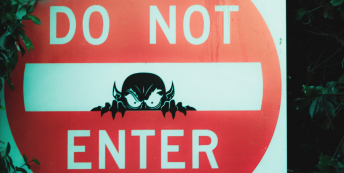
Image by Diliff
Making a career shift can feel like being overwhelmed by a barrage of choices. If you’re the kind of person who likes to keep their options open, how can you move forward? Andrea Perry explains.
“But Andrea”, said Magda, in our coaching session: “If I choose that training course, I’m closing off all my other options. I’m the kind of person who likes to keep doors open, not close them – what do I do?”
Choice is a luxury; a relatively new privilege of the world we live in. But it can feel like a tyranny. We become terrified of making the ‘wrong’ choice, believing that if we take one path, we’ll end up frustrated, hopeless, stuck, abandoned or worse.
Consider your previous patterns of choice-making
Our history of choice-making profoundly affects the way we look at options in all areas of our lives now.
If we were fortunate, choice-making was a skill we were taught.
Initially, we would have been allowed to follow our feelings in choosing from a small range of options, receiving real-world feedback on the consequences – it tasted lovely! It was hot! It was the best ride ever!
What we had to give up in those early choices weren't high-stakes stuff.
As we grew more confident and experienced, we were given more responsibility, faced bigger risks and felt confident to make a selection based on our genuine feelings, preferences, values and experience. We knew that we’d probably enjoy and be able to make the most of what we found on the other side of the door we chose, whilst accepting feeling sad about the alternatives we let go.
But you might have little confidence in your decision-making ability, either through over-protection, feeling you should follow a pre-ordained path, or if your choices ended in disaster or punishment.
You may even feel phobic and trapped when choice means closing alternative doors.
It can be hard to ‘think things through’ when struggling with overwhelming feelings of anxiety or panic.
Once you make a choice, more options appear
Whatever your history, sooner or later you come to the point where you recognise that doors are rather like the Tardis – they look different depending on whether you're on the outside or the inside.
If you can bear to choose one door in the career-shifting process, closing all the others, then you will find that you have a whole new range of new doors opening up. Ones you never imagined before you took that step forward, committed, and didn’t turn back.
In other words, once you’re inside a door of career choice, you’ll be outside a whole lot more. You can only find real openness if you are willing to close.
Creation comes, as Madonna says, when we learn to say no.
Use your history of choice-making to move forward with your career:
- Draw a time-line stretching back as far as you like. Mark dates on it when you made major choices. Include the ones that turned out well as well as those you regret. Give each title a choice – for example: ‘A’ levels; degree; first flat; moved in with a partner or got married; applied for promotion; left second job, etc.
- Which choices do you look back on with respect? What factors helped you make these successful choices? (For example, support, space, time, information, advice, a certain way of evaluating options or a particular quality, like courage or the willingness to take a risk?) Do the same factors keep cropping up, or is there a diverse range?
- Make a list of these factors. Do you have access to the most helpful ones while facing your current choice? If not, how could you build them in? Who could help you?
- Now, look at the choices you regret. What's the difference between this set and the first set? You can learn just as much from these choices as from the ones you’re pleased with. What factors led you to make the choices you regret? If, from the perspective of looking back, you can see where you went wrong, what were you discounting at that time – an opportunity, a source of support, one of your strengths or passions? Are you doing that again with the present dilemma? What can you see from these regrets that could help you make today’s choice? What would your younger self want you to do now?
You might want to involve a friend or coach in this process, both to give you a wider perspective and to invite them to notice themes you might miss.
The more doors you keep open, the more stuck you'll feel
Two things are sure. First, the longer we spend trying to keep all the doors open, the more this restricts our choices – like the person who watches their contemporaries making progress in their careers, whilst not selecting and developing one of their own.
Second, it may take several choices and going through many doorways before you make a discovery. Your core interests and abilities, strengths and passions will keep finding opportunities for expression, no matter what environment you’re in.
So if you gave up journalistic ambition to work in environmental management, you might now be involved with your company’s in-house newsletter and could look for more training or recognition in this area.
If you were ‘made’ to be an actor, but decades ago chose security over the uncertain life-style of the theatre, you suddenly notice it’s always been you that the department asks to make presentations because you're great at them. Could you find a way to develop this specialism?
You chose to go travelling rather than follow the family path into law, but you notice that, in the restaurant where you now work, you are the one colleagues seek out to help them in disputes. What's more, you enjoy doing that. Could this point you towards aspects of work-place law you’d never considered?
It happens. We can’t resist being ourselves.
And this can give hope to anyone paralysed by the thought of giving up an option.
You may need to say goodbye to something of value now. But, if it’s real, it'll come back to you.
So I’m with Madonna on this one as well. Freedom comes when you learn to let go.
What choices are you struggling with in your career change? What doors might you have to close? Leave a comment below.



